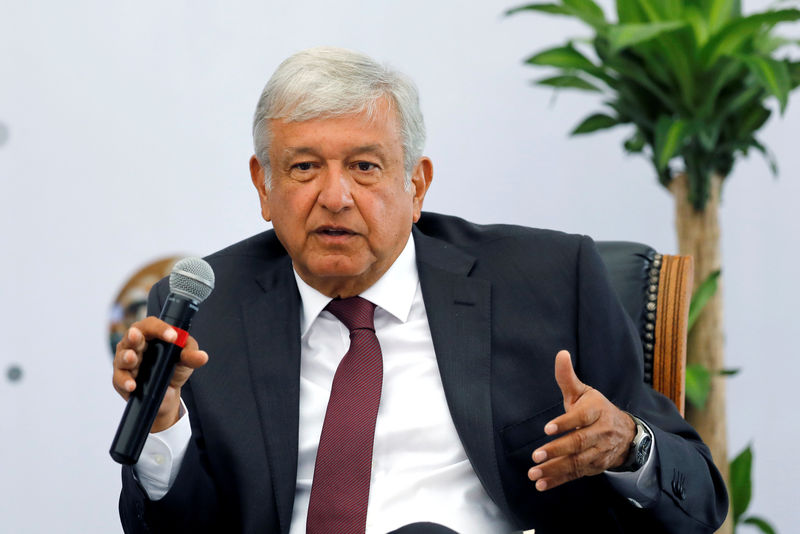By Anthony Esposito
MEXICO CITY, May 20 (Reuters) - The chasing pack of Mexican presidential candidates attacked front-runner Andres Manuel Lopez Obrador in a second televised debate on Sunday without landing major blows in exchanges that often returned to fraught relations with the United States.
Leftist Lopez Obrador sought to deflect questions, as he did in the first debate last month ahead of the July 1 election. He stuck to many of his stock responses to defend his sizeable opinion poll lead, rarely rising to the bait and occasionally mocking his rivals.
The debate, focused principally on trade, migrants, the Mexico-U.S. border and the fight against criminal gangs, drew several rebukes of U.S. President Donald Trump, whose broadsides against Mexico have stirred widespread animosity.
The second-placed challenger, 39-year-old Ricardo Anaya, crossed the stage to address Lopez Obrador face to face in a bid to rile the former Mexico City mayor.
But the 64-year-old Lopez Obrador brushed off the attacks, dismissively calling Anaya a "liar and a fraud."
"Anaya is a little bum demagogue," Lopez Obrador said, at one point laughingly telling the audience in the northern city of Tijuana he was watching out for his wallet when Anaya approached him to challenge his record as mayor of the capital.
Anaya, who is heading a right-left coalition, emerged as the victor of the first debate in some polls.
He tried to paint Lopez Obrador as out of touch, ill-informed and beholden to outdated economic models. But Lopez Obrador showed fewer signs of irritation than in the first debate, remaining in good humor and rarely wandering from his script.
'ALLIANCE FOR PROGRESS'
Lopez Obrador, who in some polls has a lead of 20 percentage points over Anaya, recycled much of his campaign rhetoric, and pledged to make Trump respect Mexico if he is elected.
"I want a friendly relationship with the government of the United States, but not one of subordination. Mexico is a free country, it is a sovereign nation," Lopez Obrador said. "We will not be subject to any foreign government."
Lopez Obrador said he would propose an "alliance for progress" that included Mexico, the United States, Canada and Central America to foster job creation, grow the economy and pacify the region. He did not offer details on his plan.
In his third tilt at the top job, Lopez Obrador has capitalized on widespread disenchantment with the ruling Institutional Revolutionary Party (PRI) over corruption, rising levels of violence and sluggish economic growth.
The PRI candidate, former finance minister Jose Antonio Meade, has struggled to make an impact, and again found himself defending the unpopular government of President Enrique Pena Nieto.
Lopez Obrador came close to winning the presidency in 2006 and was runner-up again six years later.
This time around, Lopez Obrador has cut a more relaxed figure on the campaign trail, largely avoiding the kind of outbursts that in the past helped adversaries depict him as a threat to the stability in Latin America's No. 2 economy.
Despite softening his tone, Lopez Obrador has butted heads with Mexico's business community, calling several tycoons influence traffickers who benefit from corruption. Obrador has already caused concerns with threats to walk back the liberalization of the country's oil and gas business and to scrap a new $13 billion Mexico City airport.
